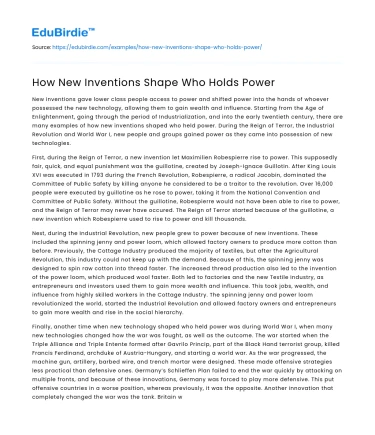New inventions gave lower class people access to power and shifted power into the hands of whoever possessed the new technology, allowing them to gain wealth and influence. Starting from the Age of Enlightenment, going through the period of Industrialization, and into the early twentieth century, there are many examples of how new inventions shaped who held power. During the Reign of Terror, the Industrial Revolution and World War I, new people and groups gained power as they came into possession of new technologies.
First, during the Reign of Terror, a new invention let Maximilien Robespierre rise to power. This supposedly fair, quick, and equal punishment was the guillotine, created by Joseph-Ignace Guillotin. After King Louis XVI was executed in 1793 during the French Revolution, Robespierre, a radical Jacobin, dominated the Committee of Public Safety by killing anyone he considered to be a traitor to the revolution. Over 16,000 people were executed by guillotine as he rose to power, taking it from the National Convention and Committee of Public Safety. Without the guillotine, Robespierre would not have been able to rise to power, and the Reign of Terror may never have occured. The Reign of Terror started because of the guillotine, a new invention which Robespierre used to rise to power and kill thousands.
Save your time!
We can take care of your essay
- Proper editing and formatting
- Free revision, title page, and bibliography
- Flexible prices and money-back guarantee
Next, during the Industrial Revolution, new people grew to power because of new inventions. These included the spinning jenny and power loom, which allowed factory owners to produce more cotton than before. Previously, the Cottage Industry produced the majority of textiles, but after the Agricultural Revolution, this industry could not keep up with the demand. Because of this, the spinning jenny was designed to spin raw cotton into thread faster. The increased thread production also led to the invention of the power loom, which produced wool faster. Both led to factories and the new Textile Industry, as entrepreneurs and investors used them to gain more wealth and influence. This took jobs, wealth, and influence from highly skilled workers in the Cottage Industry. The spinning jenny and power loom revolutionized the world, started the Industrial Revolution and allowed factory owners and entrepreneurs to gain more wealth and rise in the social hierarchy.
Finally, another time when new technology shaped who held power was during World War I, when many new technologies changed how the war was fought, as well as the outcome. The war started when the Triple Alliance and Triple Entente formed after Gavrilo Princip, part of the Black Hand terrorist group, killed Francis Ferdinand, archduke of Austria-Hungary, and starting a world war. As the war progressed, the machine gun, artillery, barbed wire, and trench mortar were designed. These made offensive strategies less practical than defensive ones. Germany’s Schlieffen Plan failed to end the war quickly by attacking on multiple fronts, and because of these innovations, Germany was forced to play more defensive. This put offensive countries in a worse position, whereas previously, it was the opposite. Another innovation that completely changed the war was the tank. Britain was able to use it to crush Germany, even though Germany had previously been winning the war after a long stalemate. The tank completely changed who held power by allowing Britain to be much more powerful than Germany, although they were less powerful before. Many defensive weapons during the first world war changed how the war was fought, and the invention of the tank completely turned the tide in the war.
Throughout history, less important and lower class people or groups have always been able to rise in the social hierarchy and displace the previous group or person in power, by using new inventions. These include the guillotine during the Reign of Terror, the spinning jenny and power loom during the Industrial Revolution, and many different weapons during World War I. These inventions have ended some periods and started new ones as different people rise to power.






 Stuck on your essay?
Stuck on your essay?

